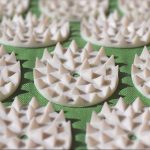Hormonal headaches occur from fluctuating hormones. Particularly the fluctuation with estrogen levels. Hormonal headaches can also be called menstrual migraines, or premenstrual syndrome headaches. These headaches can become chronic.
They usually occur during a menstrual cycle, pregnancy, menopause, or because you are taking oral contraceptives, or hormone replacement therapies. These hormonal headaches are headaches that occur and last 2 days before your period starts, to 3 days after your period starts.
Possible Causes
Menstrual Cycle
During your menstrual cycle your estrogen and progesterone levels fall to their lowest, which is why you can experience a headache during this time. It doesn’t matter how much estrogen you have in your body, but more the degree of fluctuation that can make you more prone to this type of headache.
Pregnancy
With pregnancy some women find that their menstrual headaches go away. While other women may experience hormonal headaches for the first time. Hormonal headaches can be a symptom during early pregnancy through the first trimester. After the first trimester the headaches are less common.
Perimenopause & Menopause
In some women during perimenopause, or the years leading up to menopause, they experience more hormonal headaches too. Once they hit menopause the amount of headaches may lessen. Sometimes though the headaches may worsen, especially if going through some form of hormone replacement therapy.
Other Triggers
Other triggers for these hormonal headaches may be skipping meals, too much or too little sleep, too much or too little caffeine, intense lights, smells, or sounds, severe weather changes, alcoholic beverages, stress, processed meats, MSG, aged cheeses, soy products, or artificial sweeteners.
If you experience hormonal headaches, keeping track of them, your cycle, what you eat, and how you sleep can help find other triggers.
Symptoms
The main symptom of a hormonal headache is the headache. The headache or migraine pain can be severe. It may feel like a throbbing sensation. The headache may start one side, or the other.
You may also be sensitive to light, feel nauseous, or even vomit. Other symptoms you may experience are loss of appetite, fatigue, acne, joint pain, decreased urination, lack of coordination, constipation, or chocolate cravings.
You may also experience premenstrual syndrome, PMS, symptoms along with hormonal headaches if your headache happens before your menstrual cycle.
Treatment
The best treatment is early treatment. Early treatment gives you a better chance of relief from the pain.
Something you can do at home to help alleviate your hormonal headache is to make sure you drink plenty of water. Staying hydrated is important.
For some people drinking caffeine can also help.
If possible, lying down in a quiet, dark room can also help.
Applying a cold compress, or ice pack to your forehead and eyes can also help alleviate symptoms.
Practicing deep breathing, yoga, or calming mechanisms to alleviate stress can also be helpful.
Maintaining blood sugar levels by eating small, frequent meals.
Magnesium has been shown to be a great treatment option to help prevent headaches from occurring as often or at all. Magnesium can be found in foods, as well as in supplement form. Getting it from your diet is best, but many women do not get enough magnesium in their diet. Taking it in supplement form may help you stop your headaches from occurring. Foods that are high in magnesium are greens, nuts, seeds, dry beans, whole grains, wheat germ, wheat, and oat bran.
Purium Products that Contain Magnesium:
Studies have shown that acupuncture can help reduce pain and frequency of headaches and migraines.
Using peppermint or lavender essential oils, a few drops rubbed into your temples has shown to give relief to some people.
In some cases home remedies don’t always give you pain relief. When the pain or headache has started you can take over the counter NSAIDs, such as ibuprofen to help ease the pain.
Triptans are migraine specific medications that can also help alleviate symptoms.
If you have chronic headaches, your doctor may want to seek treatment that can help you long term. This may be by either helping prevent the headaches from occurring, or decrease the symptoms when they happen. Medications your doctor may suggest are beta blockers, anticonvulsants, calcium channel blockers, or antidepressants.
If you aren’t taking oral contraceptives your doctor may suggest these. Oral contraceptives can help even out estrogen levels, which may help decrease the frequency of headaches. If you are taking oral contraceptives, looking into a different one that may have lower levels or higher levels of estrogen may be beneficial. Or wearing an estrogen patch during your placebo days may help decrease the amount of headaches.
Complications
If symptoms are new or worsening you will want to speak with your doctor. If you experience sleep disturbances, anxiety, or depression you will also want to speak with your doctor. Women who have hormonal headaches and migraines are more prone to these. If you develop dizziness, stiff neck, rash, shortness or breath, or loss of vision along with your severe headache seek medical help immediately.
Headaches can be a sign of hormone changes! #HealthSurgeon
READ MORE: Estrogen Dominance – Hormone Imbalance
Sources:
https://www.healthline.com/health/hormonal-headaches#3-Yoga-Poses-for-Migraine
https://www.medicalnewstoday.com/articles/hormonal-headaches#contacting-a-doctor
https://drbrighten.com/16-natural-remedies-hormonal-headaches/?psafe_param=1&gad=1&gclid=CjwKCAjw38SoBhB6EiwA8EQVLt6KpBBRoI8wCg-SgPj0eCoUkTa3m-7ZtIORqooUlvbTMnAx0tP8FRoCXOMQAvD_BwE









